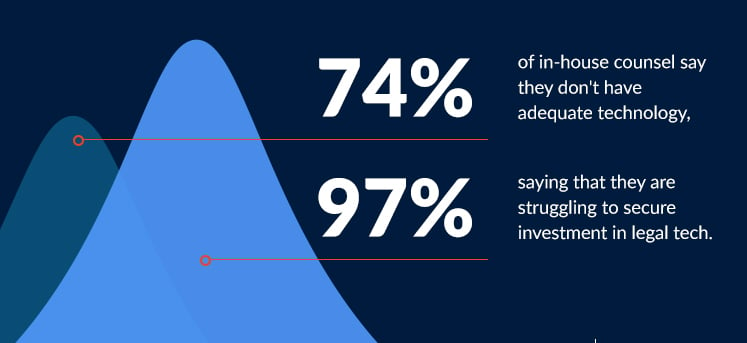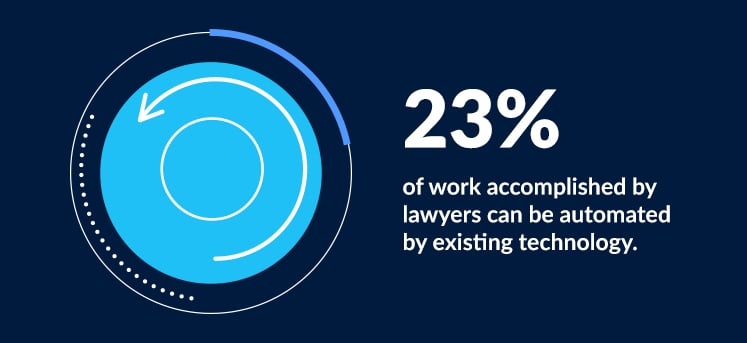Discover four reasons why legal tech will give your business a competitive advantage.
A tradition of resistance to tech
Everywhere you look, technology is driving change. How we work, socialise, consume entertainment, even how we order food has been transformed by new solutions that make it easier for us to achieve what we want to do.
Yet until relatively recently, the legal industry has resisted the lure of innovative technology, instead relying on centuries-old traditions of finely skilled and highly trained minds employing analogue contracting processes.
This has partly been driven by the need for caution that sits at the centre of the legal profession. Using a digital platform to watch an on-demand recording of the latest Scandanavian noir detective series carries little risk should something go wrong. Overlooking a critical part of a contract during a multi-million dollar M&A is an entirely different matter.
Legal tech is ready – but not all enterprises are
It is important to note that legal technology is no longer a niche or experimental market. Legal tech is big business, and will only get bigger.
In 2019, the legal tech market generated revenues of US$17.32 billion worldwide, with the market forecast to grow at a compound annual growth rate (CAGR) of over six percent for the period to 2025. By then, revenues are set to reach US$25.17 billion.
AI legal technology offerings for businesses increased nearly two-thirds in 2020 compared to 2019.
There is a lot of choice out there; possibly too much choice. In an increasingly crowded marketplace it is more difficult to ascertain which vendors deliver real value for your use case, and which would not be a great fit. It is easy to see how this leads some businesses to simply give up trying to determine which tech will deliver ROI. This is a mistake, as choosing the right legal tech will give businesses measurable benefits with quick time to value.
GCs are ready too
Our experience tells us that GCs are ready to embrace the opportunities offered by legal tech. And this is supported by research.

Studies reveal that 70% of in-house counsel say they don't have adequate technology, with 97% saying that they are struggling to secure investment in legal tech.
More than half of GCs (59%) believe that a greater use of tech can help them reduce costs, yet only half of legal departments increased their use of technology over the past 12 months. This is important because GCs say workloads are expected to rise by 25% over the next three years, with three-quarters of respondents not expecting budgets to keep pace with that additional work.
In-house legal teams are being asked to do more with less. The only way to make this happen without opening up the company to unnecessary risk or dramatically slow down the contracting process – neither of which is acceptable to the business – is to utilise technology.
Growth in legal tech is happening, but it is not happening quickly enough. Gartner predicts legal technology spending will increase to approximately 12% of in-house budgets by 2025, a threefold increase from 2020 levels. But this is still insufficient to make a telling difference.
GCs are certainly not those blocking tech investment – they are actively encouraging it. And to make this investment a reality, they need to get approval from the board for extra funding.
4 reasons why the board should invest in legal tech
1. Remove low-value tasks
One of the most common issues with in-house legal professionals is the mountain of paperwork they are asked to get through. Much of this work is necessary and needs to be done, but it offers little value. In fact, 87% in-house lawyers say they spend too much time on low-value, routine tasks.

It need not be this way. It is estimated that 23% of work accomplished by lawyers can be automated by existing technology. Gartner suggests that this is likely to double in the coming years, with legal departments able to automate 50% of legal work related to major corporate transactions by 2024.
With technology removing the grind of routine contract reviews, the legal team can therefore power through the work that was previously piling up (and is only likely to increase). They can devote more time to higher-value strategic activities and ensure that legal is no longer a bottleneck, all without compromising the quality of work or creating additional risk.
2. Speed up contracting
Time is the killer of deals. Even a simple NDA prior to a contract being negotiated can cause fatal delays to a transaction. The longer the contracting process is drawn out, the more likely the deal is to collapse.
Digitising and automating the initial contract review can save up to 95% of the time it would take a lawyer to complete the same task. With the right technology, a first pass of a contract can be undertaken in minutes, not hours.
With technology reviewing the contract in the same way as a lawyer would (but in a fraction of the time), businesses can enable safe self-serve whereby the legal team delegates the initial contract review to sales or procurement with little or no additional risk. Technology is the safety net, applying strict rules around acceptable wording and flagging terms and clauses that require further work.
This ensures that the lawyer is always in control. The contract review platform can be trained to understand what is and is not acceptable, instructed by the GC and the company playbook. Anything likely to be problematic is raised for the lawyer to review and decide on the appropriate course of action.
3. Drive revenue into the business
This is the direct result of faster contracting. Sales are not delayed by legal and can close deals faster. Rather than constantly chasing for updates, sales can do what they do best and focus on generating new deals. They are no longer bogged down in the minutiae of those at contracting stage.
Every salesperson can tell you a story of walking out of an exciting first meeting feeling pumped, only to lose all momentum when the NDA takes three weeks to negotiate. By which time all the excitement has gone, and you simply never get it back. Momentum is important in sales.

Similarly, faster contracting allows procurement to realise the full value of each carefully negotiated deal. The quicker a deal becomes tangible and real, the quicker the benefits are felt. The value seen on paper becomes a reality on the company’s bottom line.
4. Become a data-driven business
Many companies state a desire to become truly data-driven, yet are unsure how to make this happen. By digitising all contracts at the point of first review, ThoughtRiver creates a structured data set perfect for analysis. Businesses can easily explore their entire portfolio of contracts to better understand what has caused previous delays, identify common trends, and unlock insights to improve the contracting process.
In this way the business can use knowledge from existing contracts to inform how to negotiate new ones with greater efficiency. The organisation can continuously learn and optimise, updating the playbook to ensure it reflects reality.
Data insights are also ideal for adding years of experience to junior members of the legal team. They can access and interrogate contracts to understand how specific clauses have historically been treated, and tap into a huge resource of information to help them proceed with utmost confidence.
ThoughtRiver can help you prove ROI to your senior colleagues, making it easier for them to make the decision to invest in legal tech. Using a measurable equation for deal velocity, the speed with which you move from first draft contract to signature, we can help you perfect your pitch and make the business case for legal tech undeniable.




